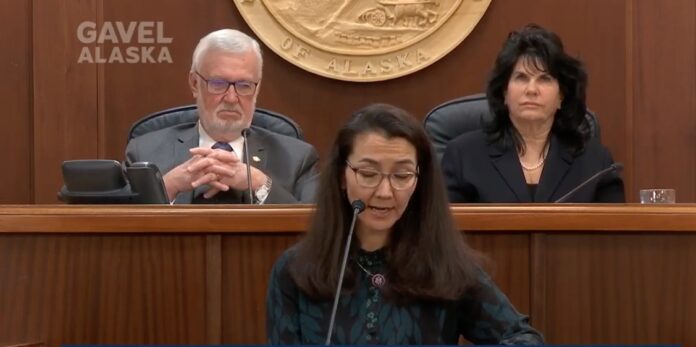In a short speech that she read to a joint session of the Alaska Legislature on Monday, Alaska Rep. Mary Peltola led with the news that the Federal Trade Commission had filed a lawsuit to stop the merger of Albertsons and Kroger grocery stores. She did that, she said.
Albertsons and Kroger announced months ago that they would be selling off at least 14 Albertsons stores (Safeway) in Alaska, in order to assuage the concerns that they would drive prices higher for Alaska if their stores were under one parent company. Peltola failed to mention that aspect of the merger, and focused on higher prices.
Peltola said it was her efforts, and the listening sessions she held to get Alaskans’ voices heard about the merger that resulted in the lawsuit against the two private sector companies. She said breaking up monopolies is the way to go, just like the government did in the old days. She contrasted the grocery store merger to the break up of the American Telephone & Telegraph Company (AT&T) monopoly in the 1980s.
Peltola did not mention that she is following the directions of major unions, which oppose the merger.
In fact, the FTC lawsuit has not much to say about prices and a lot to say about collective bargaining as an antitrust decision point..
The lawsuit says that if the two companies combined, then unions would not be able to pit one store against another during bargaining negotiations.
“In some regions, such as in Denver, the combined Kroger/Albertsons would be the only employer of union grocery labor,” the FTC said. “Union grocery workers’ ability to leverage the threat of a boycott or strike to negotiate better CBA terms would also be weakened.”
Defending union bargaining position is a new frontier for the Federal Trade Commission.
Later in her remarks to the Legislature, Peltola took questions. Asked by Rep. Jamie Allard of Eagle River to comment on the Jones Act, which drives prices higher in Alaska and makes Alaskan goods, such as fish and oil, more expensive to ship south, Peltola said she supports the Jones Act.
Alaska is disproportionately and negatively affected by the Jones Act because of its dependence on waterborne shipping. The Jones Act affects both supplies shipped north to Alaska and crude oil and fish products shipped south.
The Cato Institute, a Libertarian think tank, says “This is not only a direct assault on Alaskan’s freedoms, but their pocketbooks as well. Besides reducing competition, the law forces carriers who ply routes between Alaska and other domestic locales to buy U.S.-built ships that cost as much as eight times more than those from Asian shipyards. In addition, these ships are, on average, estimated to be 2.7 times more expensive to operate than their foreign counterparts.”
In fact, a 1982 analysis conducted for the Alaska Statehood Commission calculated that every Alaskan paid $267 more per year for goods, or more than $1,000 annually for a family of four, because of the Jones Act.
“The state’s oil industry, meanwhile, was found to suffer an additional $600 million inflation‐adjusted hit. A separate study published by the U.S. Government Accountability Office in 1988 said that the U.S. build requirement alone imposed a cost equal to 2 percent of Alaska’s total personal income,” the Cato Institute says.
The Jones Act requires that domestic cargoes be transported only on U.S.-built, U.S.-flagged, U.S.-owned, and U.S.-crewed ships. Oil cannot be exported from the North Slope without first stopping at a domestic port.
The Act has had a monopolistic effect on shipping to and from Alaska and Hawaii.
“Because the Jones Act severely limits the supply of shipping to and from our communities, it has allowed a very few companies to control our very lifeline to the outside world and as a result command shipping rates way higher than the rest of the world,” said Democrat Rep. Ed Case of Hawaii, another state that suffers from high shipping costs because of its reliance on maritime shipping. Case has worked on legislation to amend the Jones Act.
“Because Jones Act shipping has shrunken and international shipping has increased dramatically, especially in the last quarter-century, the Jones Act results in a very few carriers serving all domestic shipping needs,” Case said.
But Peltola said that in spite of whatever issues it may have, the Jones Act was good for unions, so she supports it.
It turns out, Peltola thinks monopolies are fine, as long as they are run by unions.
The Allard question about the Jones Act was the only question of policy substance from the Legislature. Other questions came from Democrats in the room and focused on things like Peltola’s grieving over the loss of her husband. House Minority Leader Calvin Schrage asked her to expound on why Alaskans should return a Democrat to Congress, allowing Peltola a few more minutes to campaign at the speaker’s podium.
